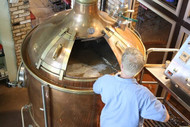How to Start a Brewery
Mar 6th 2019
Starting a brewery is the dream of a generation of craft beer enthusiasts.
What could be better than taking everything you love about beer, and creating your own brew for everyone to enjoy?
Unfortunately, many people who come into this dream do so thinking it will be easy, and end up costing themselves valuable time and tons of money. The task of building a microbrewery is lengthy, with tons of steps, rules to follow, and if you don’t keep yourself educated on the requirements, you could just make a misstep that will cost more than you’re willing to pay to go forward with your dream.
Fortunately, we’re here to help. Waterloo Paneling has been a part of brewery construction in the past, and we want to share with you what we’ve learned.
The best thing you can do for your brewery is planning it well.
A well-thought-out business plan includes everything from the structure of how your business runs, to the structure it’s physically located in. It’s a lot to think about, and so much research can seem daunting in the beginning, but research now will save you all the time in the world later.
Getting serious about your brewery plans means thinking ahead about several different aspects of your business.
You’ll Need A Business Plan
In short, that means you’ll need to sit down and write out a document that outlines how you plan to make money with your brewery. This will include costs, so start your researching now on equipment, space, and other necessities. Create a clear idea of what you want to do, how you want to do it - and how much it’s going to cost.Stainless Steel Panels, FRP and other specialty wall paneling systems are what we specialize in, and can definitely be your expert source.
Know Your Licensing
Throughout the process of building your brewery, you’re going to want to keep track of licensing. Doing research on what licenses you will need at the state and local levels will go a long way in making a smoother transition into business ownership.
Location, Location, Location
We’ve all heard those three words repeated over and over again, haven’t we? It’s hard to overstate the importance of location! A good location can make or break your business, and I’m not just talking about where the business is located, but also what’s inside the space.Luckily Waterloo Paneling can provide and install FRP wall board or Stainless Steel Panels and trim anywhere in the contiguous US.
Know Your Regulations
The most important thing you’ll need to cover in choosing your brewery’s location is regulations. What are the state and local regulations surrounding brewing beer? Is the location you’ve selected in the right zone, and do you have the correct permits?
When you have those things settled, you really need to start thinking about the interior of your space. Is it large enough for your to grow into? Is it clean, fire-safe, designed for brew production or as a brewpub?
These are the details you want to be thinking about.
Why You Want To Use FRP Panels
When designing the interior of your brewery, you want to design it to last. That’s why you want to install FRP panels: a moisture resistant, fire-resistant material that will make your life easy and keep your investment - and your customers - safe.
Here at Waterloo Paneling, we can help you make the right decision for your brewery. We offer several different kinds of FRP panels designed for food production and high-traffic spaces, making sure your long term investment lasts by resisting mold, mildew, and rot.
Selecting equipment and finding your people make all the difference.
Selecting Equipment
Your first major investment is going to be your brewing system. A good, starter brewing system, one for a new brewery, is going to cost you $160K and up. You might be tempted to go after a used system, but beware - with a used system you won’t be able to customize your new brewing setup to your specific needs, so keep your eye on the cost and only buy used if you really believe it’s worth it.

Gather Your People
Starting a microbrewery - or any business, really - is a bit like putting together a team of superheroes. You won’t be able to do everything on your own, so it’s important to reach out to the right people to help get the job done.
This starts with basic business needs, like bankers, accountants, attorneys, real estate agents, and insurance brokers. Waterloo itself falls into this category, supplying you with vital, trustworthy materials to make your business last.
It narrows down into business-specific people, like your hop-grower, your malt supplier, your label supplier. Here’s where you’ll find the people who supply your tanks and the people who provide your packaging.
Seek out these contacts early, research the best ones, and remember - businesses are about relationships, and you need to nourish each one for your business to grow. Having a good contact in the right place can make you, and the wrong one can bring you tumbling down.
Now that you’ve made a business plan and found your perfect contacts, you may be wondering: how on Earth are you going to get the money to start your brewery?
With so much to do, the amount of startup capital you’re going to need is not small.
Fortunately, there are a few answers. Unfortunately, most banks won’t be handing out business loans to startup companies. Most banks like to see some proof of established business before they’re willing to dole out cash to you, so when you get started you’ll need to think a little bit outside the box.
The most obvious answer for funding is going to be friends and family. If you can talk to those who are close to you and show them the detailed business plan you’ve worked up, you may be able to raise enough cash to at least get started.
If friends and family aren’t enough, you can always look to crowdfunding. Kickstarter and GoFundMe are both great options for covering startup costs, as long as the campaigns are run right, with enough PR and outreach.
You can also look into small business loans. The Small Business Administration has several options on offer for new businesses, but keep in mind - breweries and food service are seen as risky ventures, so you may have to look to alternative sources.
Sites like Funded.com offer access to angel investors - individuals who are willing to make personal loans in the interests of a startup company. You may find an angel investor specifically looking to invest in a brewery, and if so, your detailed business plan will come in handy!
There are a host of things that can go wrong in your brewery, so you want to be prepared when the time comes.
You need insurance. Remember, anything can happen - from crime and theft, to the wear and tear of your equipment, and everything in-between.
Aside from that, there are legal requirements for insurance, and you need to know what they are and how you can meet them. Talk to a business insurance agent that has experience in your field and your location, so that you’re getting the right protection.
Make sure you’re covered so that when the inevitable happens, you aren’t taking too much of a hit.
Did you know? When you open a brewery, you have to apply for a Brewer’s Notice from the US Government. That’s basically a permit to brew beer in the United States - and sell it commercially.
The process for getting a Brewer’s Notice is long and arduous, and that’s not counting what may be required at the state and local level. There are a ton of regulations involving brewing beer, and you’ll be expected to comply to all of them.
The Alcohol and Tobacco Tax and Trade Bureau is a good place to begin if you’re looking to figure out where you stand and what laws you need to comply with to stay in the legal green. But don’t just rest there. Do your research on what organization oversees alcohol in your state - they’ll have regulations for you, too.
Whatever you do, be patient. Brewing laws are complex, and chances are the process involved to keep up with them is arduous. Your dream is worth the painstaking process it will take to keep up with these laws.


